An INFJ has a dark side that is less talked about. Great names like Mahatma Gandhi, Mother Teresa, and Nelson Mandela were the likes of INFJ Personality type. But yet again, INFJs play a host to the darker figures like Adolf Hitler and Osama Bin-Laden.
All these people were passionate about what they did. They were in fact extremely passionate for a cause that they believed was good, true, and just. Something that I’m sure many of us can relate to.
INFJs are often typecast as the non-emotional person with a calm exterior but what belies is the seething mass of emotions and thoughts being played out.
Considering an individual’s life experiences and maturity level, INFJs can be polar opposites, whether perceived as good or evil, deep within they have a wave of emotions ready to drown the toughest. INFJs are factually correct and would do things only if they believe in them.
However, I’d still like to delve a little further into the dark side of the INFJ personality type. Taking notice of a few things that INFJs typically struggle with.
The Dark Side Of The INFJ Personality Type
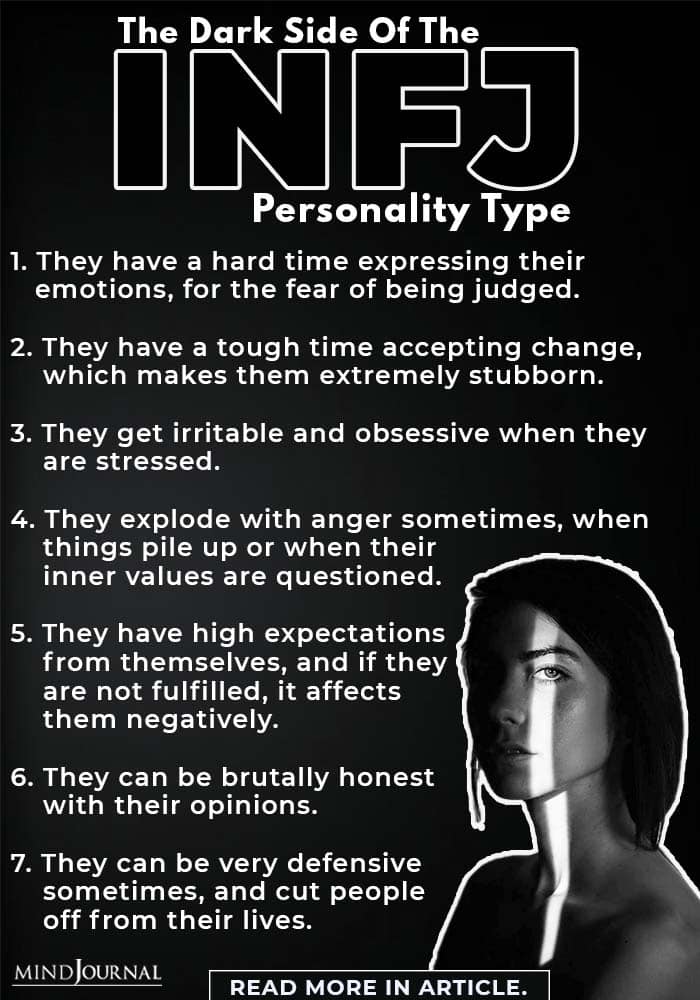
1. Emotion
Even if you think that INFJs are calm and content, the real inside of us can be difficult to understand. Our mind is constantly fighting with our emotions and at times it gets hard to cope with all the side effects. Nearly always, we are very reserved with our feelings and do not want to share for the fear of not being correctly understood.
Even when we do talk about how we feel, we keep apologizing. But the need to confide in someone is always way too strong. Sometimes when we talk about our deep feelings, we expect others to listen and not be judged. We may not share our feelings with anyone who criticizes or gives too much advice.
Read 9 Signs You Are An INFJ: The World’s Rarest Personality Type
2. Stubborn
Change is inevitable, but INFJs have a tough time accepting the change. This is often considered as being stubborn. We tend to plan things way too much into the future.
We plan things till the end of time, but unfortunately, not everything happens as planned. This obviously makes all the planning futile. Accepting this situation becomes uneasy and the mind becomes restless. Facing reality does take time, but if given enough time for the mind to settle with truth, we can get along with life and accept things for what they are.
3. Shadow of Stress
INFJs are not comfortable when forced to use their Sensing capabilities. Making a “sensing mistake” that involves facts or details can make us “annoyed or defensive. On a small level, stress can cause us to focus obsessively on external data making us irritable and obsessive.
Stress can also make us overindulge in sensual pleasures like overeating, shopping for things we don’t need, and generally becoming self-centered. On a larger level, stress makes us take an adversarial attitude toward the outer world. The third is a defensive response to feeling like the entire world is spinning out of control.
4. Anger
Stress isn’t the only thing that can bring out an INFJ’s dark side, conflict can also be the trigger. When our inner values are questioned, we might become extremely harsh and rude. But when we are wronged, we deal with patience, and even when hurt inside, we try to stay calm.
It is when this negative energy piles up, we react. Such a reaction might be at a time of minor conflict and might feel like a sudden explosion of anger. But the frustration was built up in course of time which happens to burst out on a simpler thing. In such a situation, we might not be able to control what we say.
We might speak ill and use heart piercingly strong words. If we could speak up when such minor offenses occur, we would be able to prevent such violent anger explosions.
Read 25 Genuine Signs Of An INFJ Personality Type
5. Expectations
We have set a very high standard for ourselves. We feel capable of doing things others would not even consider thinking. This we do for our close and loved ones also. We expect them to do things at a level beyond their comfort zone. Meeting expectations every time is difficult, and this does affect us in a not-so-good way.
But we expect this only from the ones we love. So basically it means that the higher the expectation from a person, the more we love them. Such expectations are mostly for having a perfect romantic relationship, wanting to have picture-perfect and everlasting love. But when with time the intimacy fades off, it makes us disheartened and pushes us to question the whole foundation of the relationship.
We feel that getting into this relationship was a huge mistake. But this just shows how much we care about the person we just questioned.
6. Bluntly Honest
Honesty is the best policy. But in this diplomatic world, we have to choose our words carefully. A neutral answer is best preferred. Unfortunately, we INFJs are too honest to convey our thoughts with softer words.
And to make the situation more complicated, we have the urge to give advice to every person seeking help. We love to analyze a situation and give suggestions.
Even when we try to be gentle, the words somehow come out harsh and rude, and judgemental, and that’s the dark side of an INFJ personality. Our intentions are pure and all we want is the best for you, but we speak more on the negative side of the situation rather than positive. We can be rude but never false.
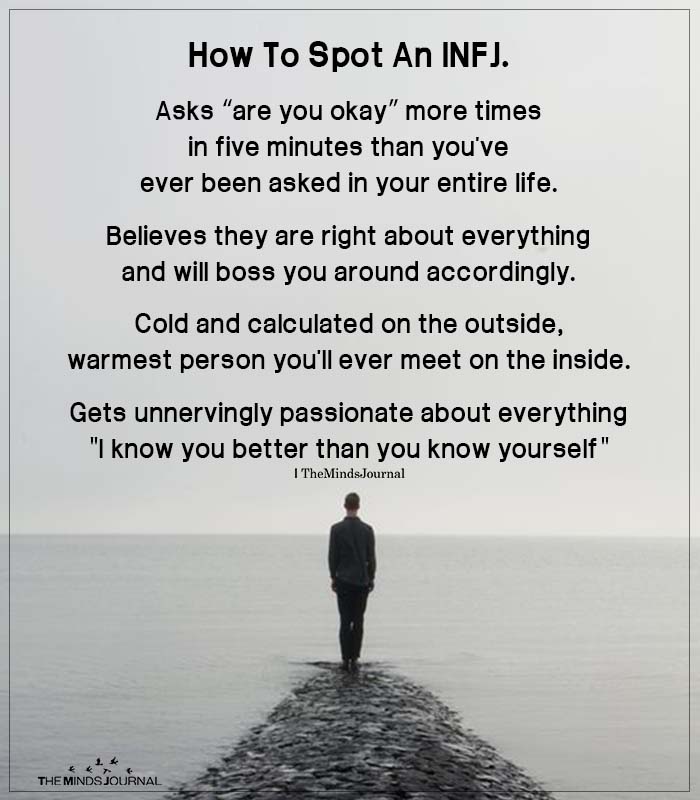
7. Defensive Attitude
Many times people hurt you more than you can take. Some people bring you stress, pain, and depression. These people may not be bad or mean any harm to us, but facing them makes things more difficult for us.
This is when we adopt a defensive attitude. We try avoiding such people and cut them off our lives. We may stop all sorts of communication with such people. Even when it is not practically possible (like when you meet them daily at work, home, etc) we detach from them completely, both emotionally and mentally.
This is not done on purpose, and we do not do it knowingly. It is like we are on auto-pilot and all our actions are controlled by our subconscious mind.
What do you think about INFJ dark side? Let us know in the comments below.

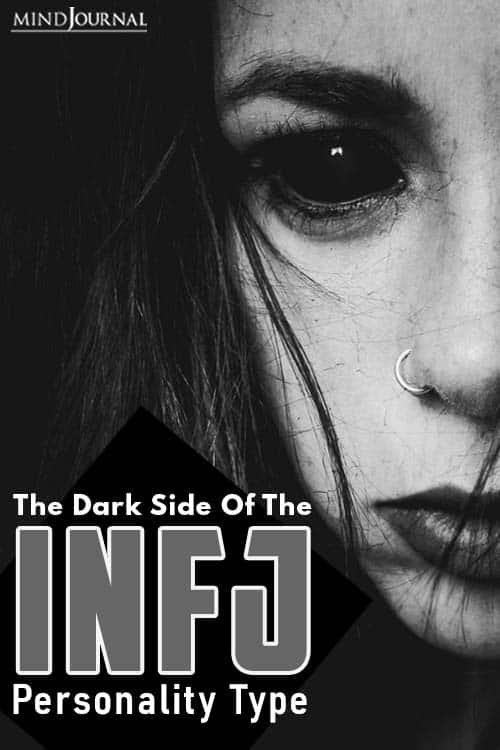
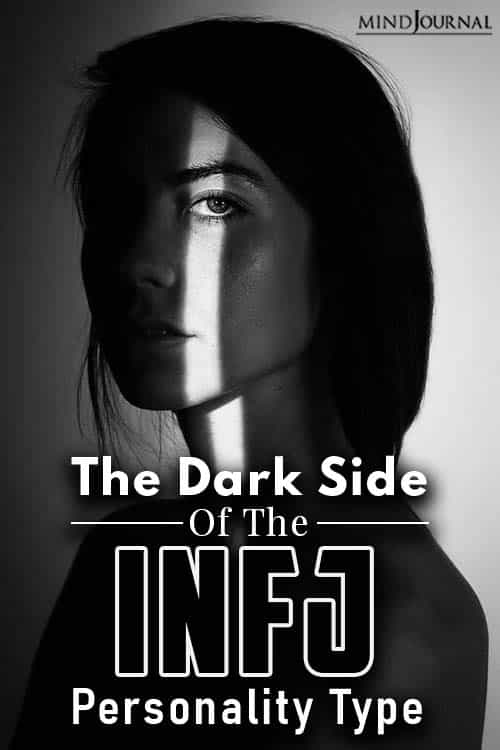

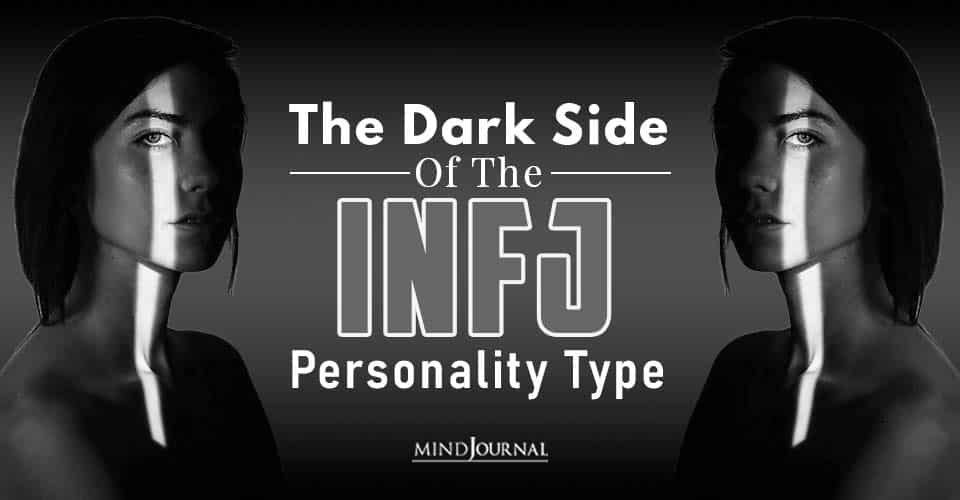







Leave a Reply